“I’m too cheap to hire a guide,” is what the older gentleman said to me, in crotchety jest, as he strolled up to the boat ramp where my guide was launching his drift boat into a river. Ye Olde Dude admitted that he had never fished. During what turned out to be a super technical day, casting #20 dries to spooky fish that I rarely saw rising, I wondered at how Ye Olde Dude would fare fishing this unfamiliar-to-him river. It was a tricky day and I relied entirely on my guide’s superior vision not only to spot feeding fish, but also to track where my teeny tiny speck of pocket lint landed and if my drift was headed to this unseen fish holding in the microseam he had just told me to cast six inches farther into. “I think you and I have a different idea of what six inches is,” became the day’s tagline on repeat.
The day was a fun kind of challenge, though, and not a total loss. We were able to bring good fish to hand, and my brother-in-law, who was on only his fourth fly fishing trip, landed an 18” brown after missing a bunch of epic takes that any other fly angler on that river would’ve traded their grandfather’s bamboo rod collection for. But you know who should get all of the credit for my brother-in-law out-fishing me? Our guide. Our knowledgeable, patient, and funny guide.
I spent the first 20-ish years of my fly-fishing life teaching myself how to suck at fly fishing—and I got pretty good at being terrible at it. But then I took my first guided trip and had the glorious “Ah-ha!” moment of discovery, similar to the first time I learned to ride a bike, stripped of its training wheels. A guided fishing trip shouldn’t focus solely on how many fish you catch. It should be about how much you learned when catching, or even not catching, those fish.
Like most things of value (a reliable truck, fly rods, good sushi…), there’s a high price attached to having a premium experience. So I get where Ye Olde Dude was coming from when he joked about being too cheap to hire a guide. But then, how much frustration can you take missing fish on a river you don’t know? Especially when those fish seem to be fickle little buggers who will decide on a whim to stop eating male blue winged olives and eat only female blue winged olives? Yeah, it was that kind of day with those kinds of fish.
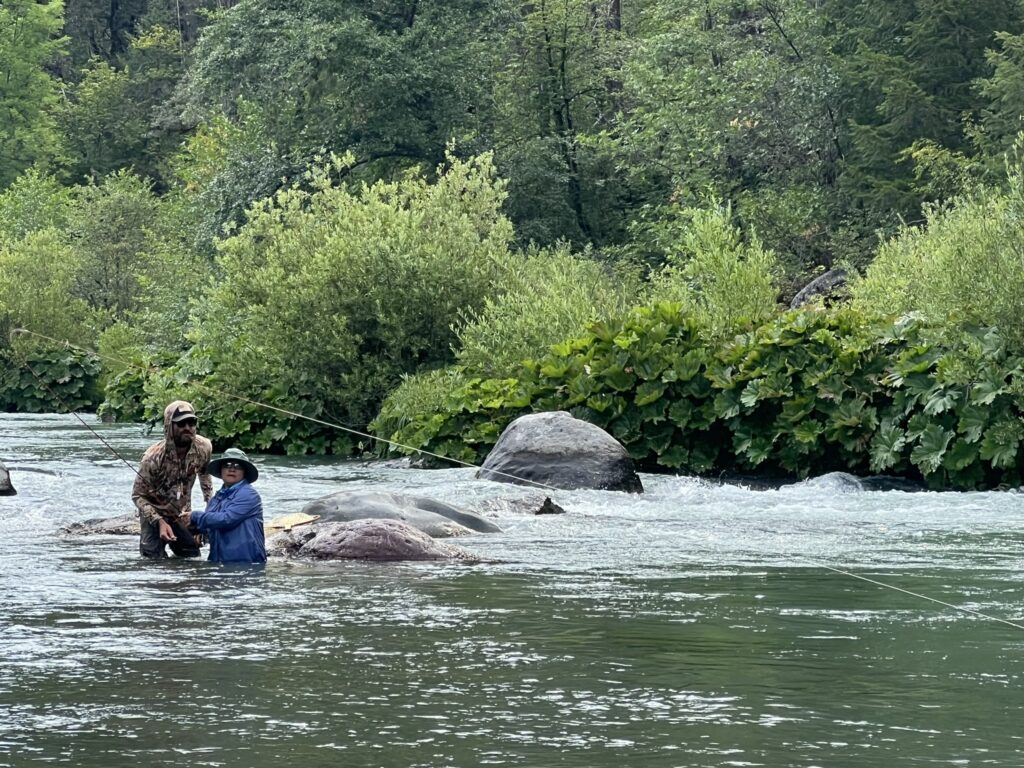
In the past 15 years that I’ve used fly fishing guides, I’ve learned a ton about how to become better at this sport. But I’ve also learned a ton about how to be a good client, or “guest,” of the many guides I’ve been fortunate to meet. Here’s my short list for how to be a good guest on a guided fly-fishing trip.
- Make it fun! Spending time outdoors while fly fishing is a real treat and can be a lot of fun. So, I make sure to roll out the fun vibe with anyone who’s fishing with me.
- Set expectations early. Before we’ve even come close to touching water, I usually let my guide know, “My goal today is to learn something new and maybe catch one fish.” That always takes the pressure off every guide I know who’s had their share of anxious “I wanna catch a lot of fish!” clients. It also sets up the next time-worn joke after the first fish hits the net, “Welp, there’s my one. Take me home now!”
- Be an open-minded student. Guides are fly-fishing experts full of information that can help you become a better angler. Take advantage of the opportunity to learn something new. I’ve learned new casts and techniques, been privy to “secret” (and deadly) fly patterns, and discovered countless ways to enhance my enjoyment of the sport. There’s probably a good reason why a guide might do something differently from your usual fishing methods. Remember, they spend far more days on that water than you do, so they probably know a few more things as well.
- Invite your guide to fish a little. Usually, a guide will refuse when I hand them my rod and ask them to fish because they probably don’t want to catch what might be the only or best fish of the day. However, some of the finest casting I’ve ever seen has been while watching a guide fish. I also get to observe how they mend and set up a perfect drift. If they hook up, they usually try to pass the rod back to me, but I prefer netting for them instead. This way, I can learn how they play and land a fish while remaining calm in that joyful, panicky chaos.
- Be gracious and humble. “Please” and “Thank you” go a long way when you strip in a bird’s nest of leader and tippet that your guide either needs to cut apart or turn into a macramé hanging plant basket. “Sorry” for a tangle will often get shrugged off, but the fly-fishing gods won’t begrudge you for putting some humble remorse into the universe when you mess up.
- Tip generously. Even though it has been nearly 40 years since I worked as a waiter, I still remember exactly who the good and bad tippers were. Don’t let yourself be remembered as a bad tipper. Guides are working just as hard, if not harder, on a slow fishing day trying to get you onto a fish than they are on a day when you lost count of how many you caught. Show gratitude for every effort with a fat tip at the end of the day.
- Don’t be a jerk… just don’t. I’ve heard different guides recount a terrible day with an abusive guest, only to realize they were all talking about the same guy—we’ll call him Felix the Podiatrist from New Mexico. The kicker is that I heard another guide in a faraway state talk about an abusive guest and then say, “So I’ll never fish with Felix the Podiatrist from New Mexico again.” Same friggin’ guy! And he’s apparently burning through guides across the country! Don’t be a Felix! Our awesome sport doesn’t need that bad juju energy.
So, how do you choose a guide? Local fly shops usually have a good stable of local guides and outfitters for virtually every destination you can imagine. Your local fly-fishing club and its members are also a valuable resource for guide referrals. I’ll caution that the internet is probably the last place you should start, as I find searching “fly fishing guides near me” just as helpful as searching “why does my chest hurt when I lie down?” Nope. Bad rabbit hole.
California Fly Fisher can also be a valuable resource for finding guides. The destination articles often recommend guides in the area or are even written by local guides, such as Spring 2025’s coverage of the Truckee by Matt Heron. Supporting the guides who support the magazine is a good practice as well.
Hit me up in the comments here if you would like a guide referral. And if you are a guide reading this, please share any other advice you have for guests in the comments.


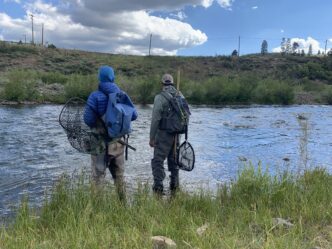
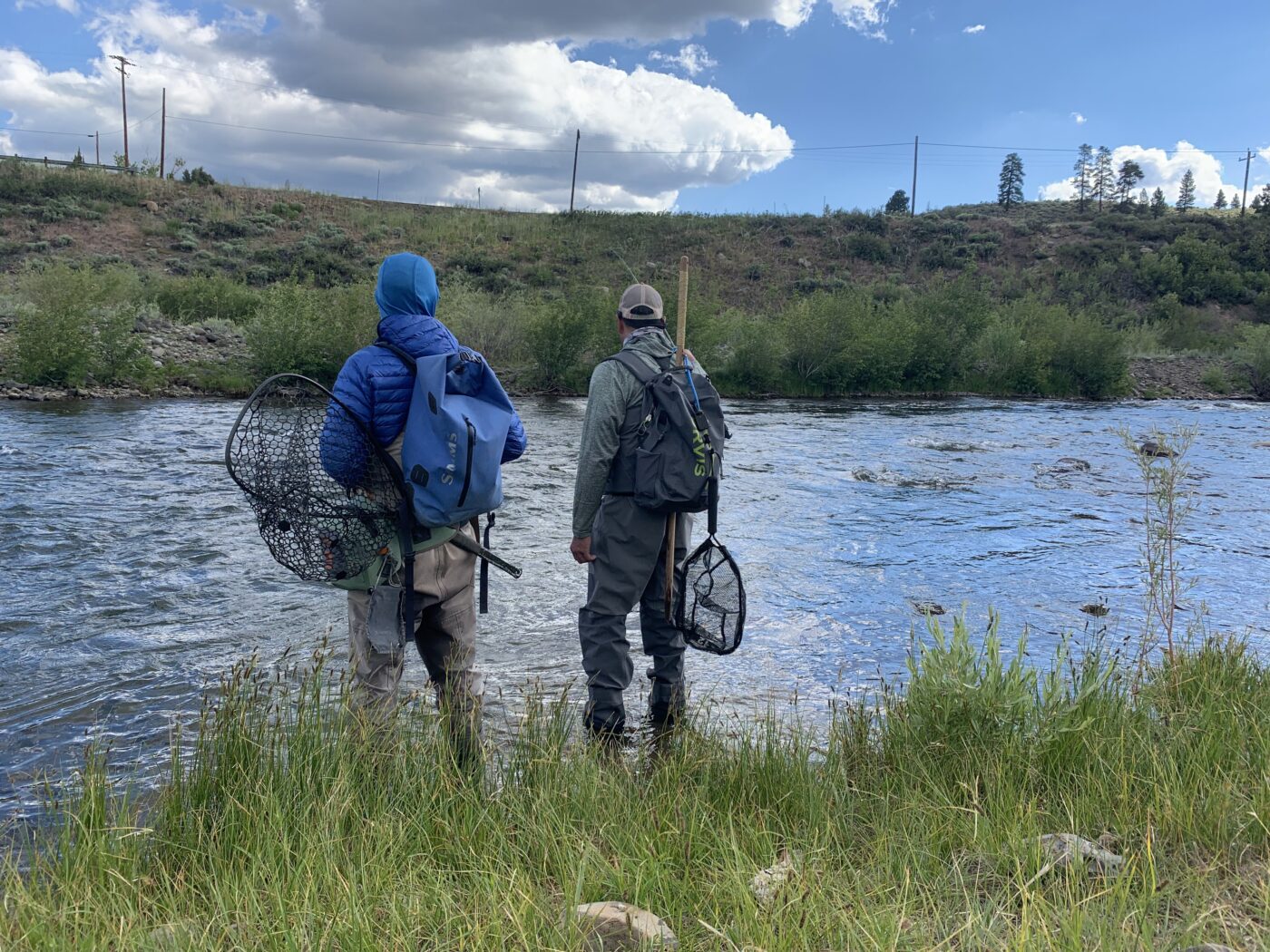

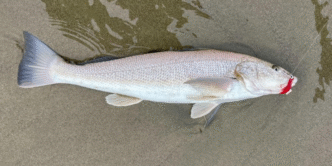
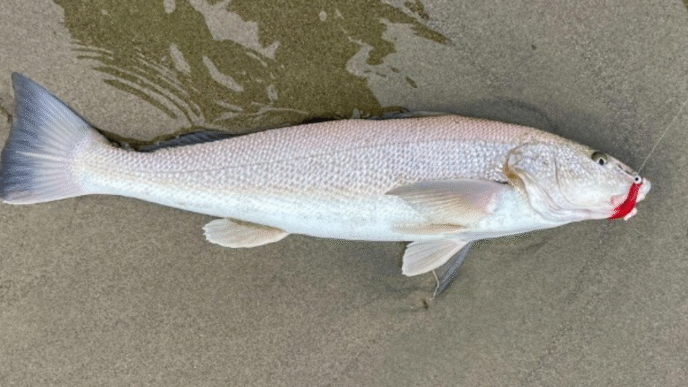
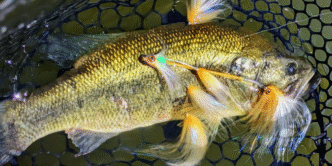
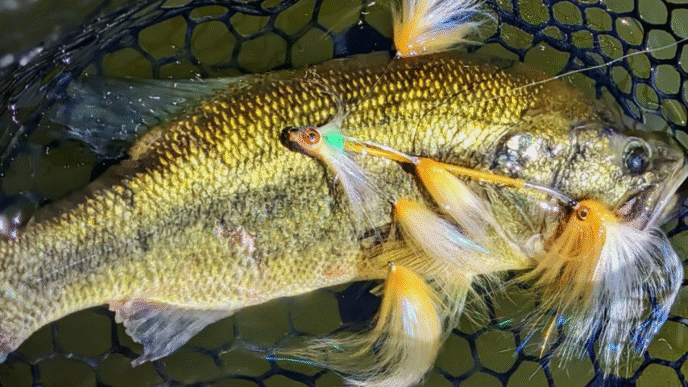
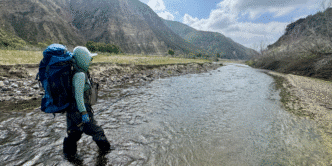
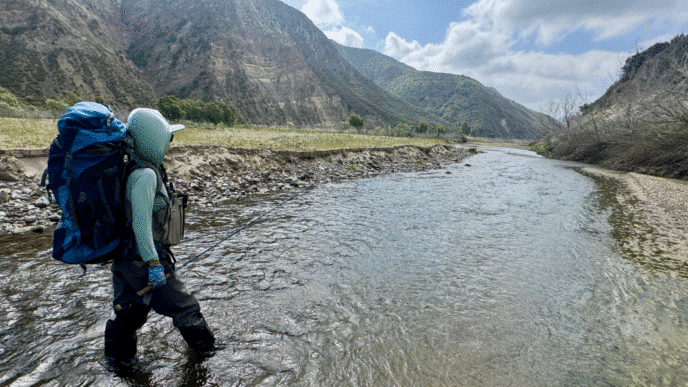
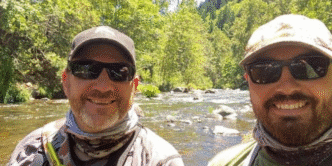
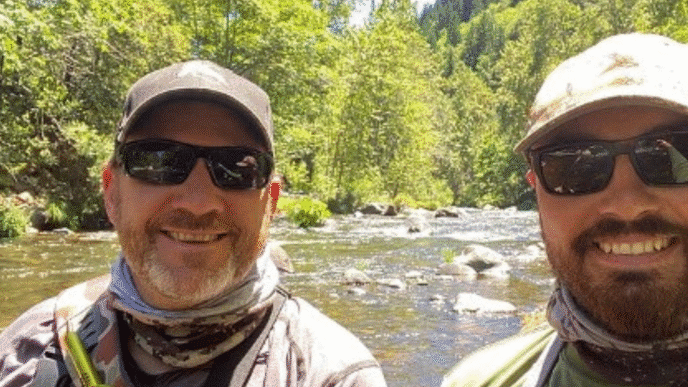
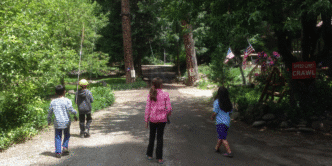
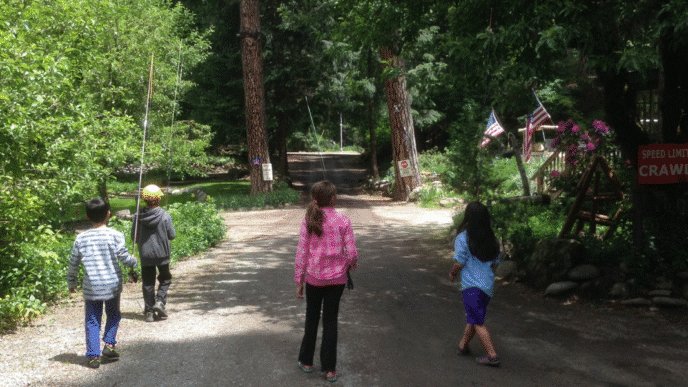
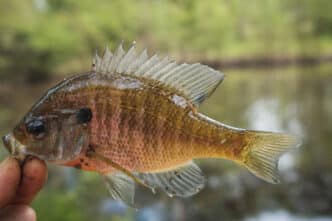
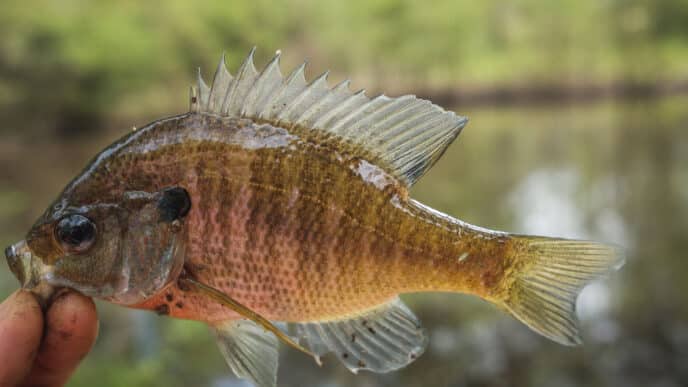
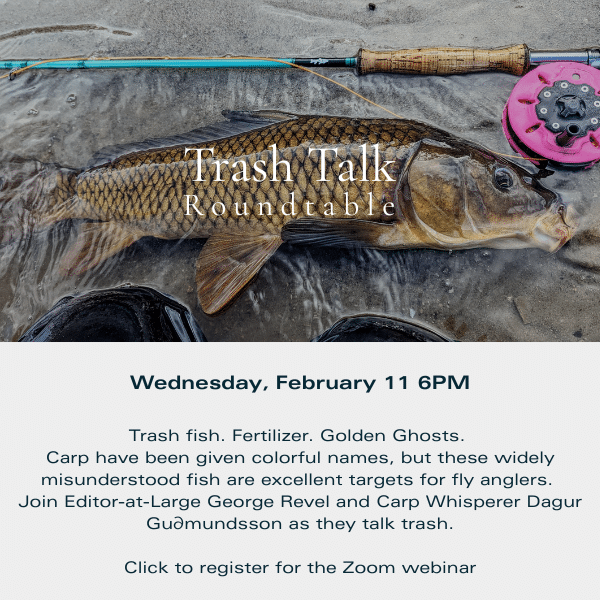
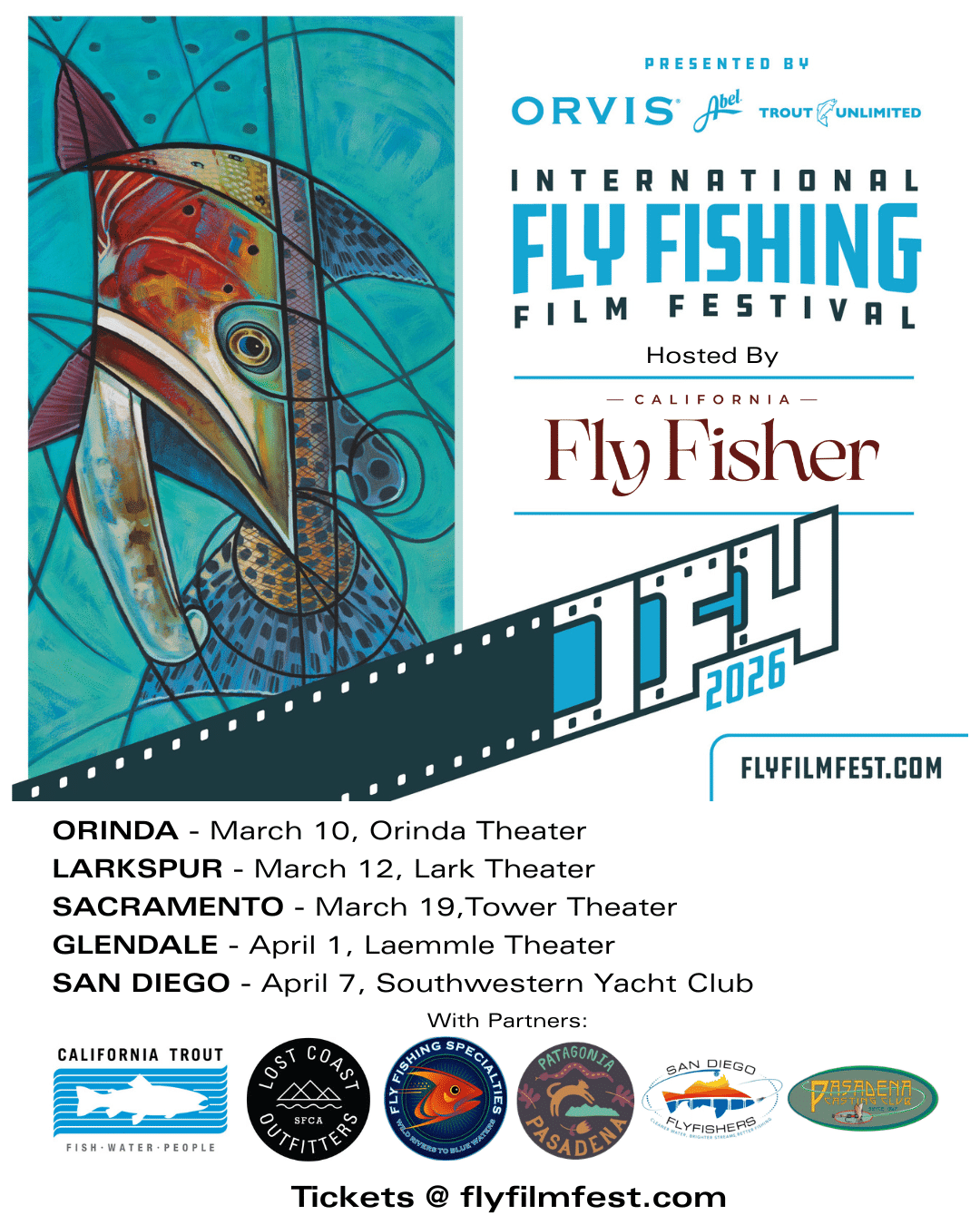
Lots of good tips here in this story. One important thing left out is, the importance of doing research about the body of water before fishing and asking questions to learn your guides history with it. I always hope to learn insight that isn’t in a book.
Great tip! Thanks! I’ve had guides show me some pretty cool stuff that they know about the area that definitely isn’t in any books!
Thanks for the great write-up Curtis! One thing I would add is to try to develop a relationship with your guide. Whether I am fishing with a guide for one day or a week, I usually am able to develop some sort of connection with my mentor. Whether it’s a treat at the end of the day (cookies, cold drinks,…bourbon😜) a little goes a long way. On multi-day trips my fishing buddies and I put on a dinner for the guides. It’s a great way to get to know them and learn a lot in the process. Some of my favorite memories are the times we are not fishing and just talking. Thanks again for the great article!
Thanks! My good-at-being-guided daughter usually brings a treat for whoever’s guiding her–and now I suspect that contributes to her regularly outfishing me… Dinner for the guides is a great idea! I’m sure that gracious gesture is heartily appreciated by your hardworking guide friends!
Great article! AMEN.
I would amplify everything you wrote, plus
– ask a ton of questions—you are paying for this service, be sure to leave the day a better angler than you started
– be open with your guide…on your abilities (strengths and areas to improve)…and start the day with something specific you want to work on (not just “catch a lot of fish”)
– bring a good joke or story. You are going to spend hours with this person–everyone wants to enjoy their work day–help make it a great one for everyone on the boat (or wading group…)
Thanks for this article!
Thanks! Those are all great advice! I like your suggestion of being open with your guide about your abilities and offering something specific you want to work on–my terrible hooksets are proving to be a hard habit to break. Coming in with a good joke or story is also great! I’ll confess I’ve got a repository of Dad Jokes on my phone that I’ll try to remember to share on my next guided trip. Oh wait, you said “good jokes”… Thanks for sharing!
A rant and some questions regarding tipping.
Guides should not have to depend on the generosity of their clients to be paid fairly for the work and services they perform. The article makes mention of leaving a “fat” tip, but what does that mean?
I was recently at lunch (for 2) where the bill had 20% gratuity automatically included as a line item, as well as a final option to leave an additional tip. It is all so confusing, awkward, even. I find the idea that workers (waiters, guides…) provide better service in order to earn their tip false. People take pride in the work they do. I have never worked as a guide, but I imagine it is a passion driven profession.
With the rant over, I have a couple of questions.
1. Is there an industry standard for tipping guides and/or are there regional differences?
2. Would it be reasonable to work out the final price with the guide prior to the day of fishing? In other words, could I ask the guide what they are expecting in total compensation? Asked yet another way, could I ask the guide, what is your time and knowledge worth?
Thanks for your comments and questions! You raise some good points about guides being paid fairly for the work and services they perform, and yes, I agree tipping protocols have become confusing and potentially awkward with just about everyone asking for a tip these days. As a former waiter, tips comprised the bulk of my compensation as the hourly wage was far below minimum wage. However, just like with every guide I’ve had the pleasure of fishing with, the high level of service never wavered and was not calibrated in anticipation of a poor or generous tip.
Now, I’ll do my best to answer your questions here.
In researching various fly fishing industry sources, while tipping can vary based on the type of trip (float vs. wade, how much driving is involved, etc.), I would say at least $100 for a full day of guided fishing is standard. A generous tip would be 20-25% of the trip’s cost. What I consider “a fat tip”, for me, is anything more than 20%, and that’s to acknowledge some extra effort put into ensuring I have a memorable day fishing.
Your second set of questions raises some interesting points. Personally, I’ve never tried negotiating the rate for a guided trip, so I don’t think I can give you a definitive answer as every person and situation is different. In my experience, a fly fishing guide is an expert with deep knowledge and a keenly unique skill set. They are going to work very hard to ensure you have as good a day fishing as possible. In that effort they will share knowledge, teach you to be a better angler, take responsibility for your safety (a guide once got between a rattlesnake and me and my daughter!), etc. You’re paying for that expert’s application of their knowledge and skills–and I for sure bumped up the tip for that guide who stood ground between my daughter and that rattler!
Thanks, again, for your comments and questions!